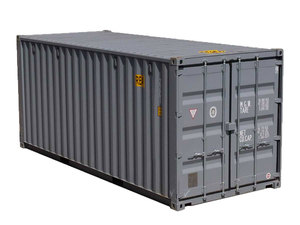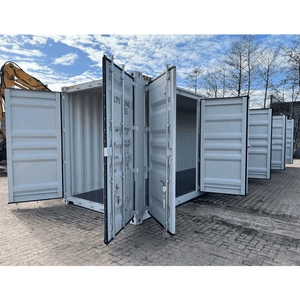(215637 products available)




























































































































































A used vessel is any ship or watercraft that has been previously owned or used but is currently available for sale, trade, or transfer of ownership. Used vessels for sale are available in different types and sizes, and each type is designed for a specific purpose or application. Here are the main types of used vessels.
Yachts
Used motor yachts for sale and used sailing yachts offer luxurious and recreational experiences on the water. Motor yachts are powered by engines, while sailing yachts rely on sails. They come in various sizes and specifications, from smaller pleasure crafts to large, opulent vessels.
Fishing Boats
Commercial fishing vessels are designed for different types of fishing activities, including longlining, trawling, and netting. Used crab vessels and used shrimp boats are equipped with fish holds, processing equipment, and navigation systems. Recreational fishing boats, on the other hand, are meant for angling and leisure fishing. These boats are usually smaller and feature rod holders, live wells, and fishing gear storage.
Cargo Ships
Used container ships are designed to carry standardized cargo in containers, making intermodal transportation efficient. Used bulk carriers transport unpackaged goods, such as coal, grain, or minerals, in large quantities. Used tankers transport liquids like oil, chemicals, or gases. They are equipped with specialized tanks and pumps for safe transport.
Passenger Vessels
Ferries are used to transport passengers and vehicles across water bodies, connecting different land areas. Cruise ships offer luxurious travel experiences with various amenities and entertainment while transporting passengers to multiple destinations. Barges and used cargo vessels are primarily used to transport goods, although some may have accommodations for crew members or even passengers.
Commercial Vessels
Research and survey vessels are used for scientific studies, environmental monitoring, and marine research. They are equipped with laboratories, sampling equipment, and various sensors. Used tugboats and push boats are used to maneuver and assist other vessels in ports, harbors, and waterways. They are powerful and have specialized equipment for towing and pushing.
Specialty Vessels
Icebreakers are used to clear frozen waterways for navigation and transport. Fireboats are equipped with powerful water cannons and firefighting equipment to combat fires on land and nearby vessels.
Used vessels are useful in many industries and can be used for various purposes. Their application depends on the type of vessel and what industries need them.
Pharmaceutical
In the pharmaceutical industry, used stainless steel vessels are helpful to make drugs. They can be used for mixing, reaction, fermentation, and storage. The used pharmaceutical vessels are ideal because the cost of making drug products reduces. Also, the equipment has already been validated, saving time and money. Using used vessels in drug-making ensures compliance with industry standards.
Food and Beverage
Used vessels are excellent for brewing and processing drinks. Buying used brewing equipment is a popular option among breweries, wineries, and other beverage producers. The equipment's previous use proves its capability, and it offers an economical way to expand production. Used dairy equipment is also popular among manufacturers of milk products.
Oil and Gas
Used pressure vessels are applied in the transportation and processing of oil and gas. The vessels must meet strict industry standards. Buying used pressure vessels is a common practice in the oil and gas industry. It provides a cost-effective alternative to purchasing new equipment while offering reliable service. Used storage tanks are also popular for storing crude oil and other products.
Marine Industry
Used marine equipment and vessels provide an economical way for many boat owners to enjoy the sea. The equipment is available in various types, from fishing gear to pleasure craft. Used yachts for sale are a popular option among people looking for a luxury vessel at a lower cost. Used cargo ships are also available for those looking to engage in freight transportation.
Chemical
Used pressure vessels are useful for storing and transporting chemicals. Used chemical tanks are also popular among manufacturers and distributors of chemicals. The vessels provide a safe and cost-effective way to conduct various processes.
Knowing the various kinds of vessels and their advantages can assist one in selecting the proper vessel for their business. Here are a few factors to consider while choosing a used vessel.
Cost
The cost of a used vessel will vary based on its age, condition, and size. It's important to set a budget and find a vessel that fits within it. However, it's also important to consider the long-term costs of maintenance and operation when evaluating a vessel's price.
Condition
Surveying the condition of the used vessel is critical. Buyers should get an expert to examine the vessel to check for any hidden problems or needed repairs. The vessel's maintenance history, including any previous repairs or modifications, is also essential.
Size and Capacity
Consider the size and capacity of the used vessel. A larger vessel may be more expensive but can carry more cargo or passengers. Conversely, a smaller vessel may be more affordable but may limit one's ability to generate revenue. Consider the intended use of the vessel and how size and capacity will impact its performance.
Fuel Efficiency
Fuel costs are a significant expense for vessel operators. Choosing a used vessel with better fuel efficiency can save one a lot of money in the long run. Look for vessels with modern engines and fuel-saving technologies.
Regulatory Compliance
Ensuring the used vessel complies with all applicable regulations and standards is essential. Regulatory requirements can vary by location and intended use, so doing research before purchasing a vessel is essential. Failing to comply with regulations can result in hefty fines and legal issues.
The primary function of used vessels for sale is to transport goods and materials across different regions and countries. They can transport various goods, such as raw materials, finished products, foodstuffs, and machinery. Some vessels are also used for offshore operations, such as oil and gas exploration and wind farm installation.
Transportation
Used vessels are primarily designed for transportation. They can transport various cargo, including bulk goods, containers, and liquid materials. Used container vessels are specifically useful for transporting containerized cargo, while bulk carriers and tankers are ideal for bulk goods and liquid cargo.
Storage
Another important function of vessels is storage. Cargo holds and tanks on the ships can store cargo until transported to the destination port. This function is especially necessary in maritime trade, where cargo transportation can take time.
Fishing and Aquaculture
Fishing and aquaculture vessels are not only used for fishing but also for processing and aquaculture operations. Fish processing vessels can process and freeze fish at sea, improving shelf life and reducing spoilage. Aquaculture vessels are useful for farming and harvesting fish in open seas.
Durability and Maintenance
Used vessels are built to be durable and can withstand the harsh marine environment. However, the level of durability and maintenance can vary depending on the age and type of vessel. Regular maintenance and repairs are necessary to keep the vessel in good condition and ensure safety.
Safety is a top priority in the design of used vessels. They are equipped with safety features such as lifeboats, fire suppression systems, and emergency beacons. In addition, safety regulations dictate how cargo is secured, how the vessel is operated, and how the crew is trained. Used vessels must pass safety inspections to ensure compliance.
Comfort and Amenities
Used passenger and recreational vessels are designed with comfort and amenities. These include cabins, dining areas, and entertainment rooms. Cargo vessels may also have crew accommodations, although less luxurious than passenger vessels.
Hull and Structure
The hull and structure of used vessels are designed to withstand the rigors of the sea and support the vessel's weight and cargo. Hull materials are usually steel or aluminum, and the design varies depending on the vessel type. For example, hulls on fishing vessels are designed for stability, while hulls on cargo vessels are optimized for cargo capacity.
Propulsion and Power
The propulsion and power systems of used vessels are necessary for their operation. They include engines, fuel systems, and electrical systems. Vessel size and speed requirements determine the size and type of engines. The engines are built to be durable and efficient, powering the vessel for many years.
Navigation and Communication
Navigation and communication systems are vital for the operation and safety of used vessels. These systems include radar, GPS, and radio systems. Vessel type and operating area determine the complexity and level of equipment. These systems allow the crew to navigate, communicate, and operate the vessel safely.
Q1: What are the different types of used vessels?
A1: The various used vessels include cargo ships, oil tankers, container ships, bulk carriers, and special project vessels.
Q2: How is the used vessel purchase process?
A2: The used vessel purchasing process involves identifying requirements and specifications, conducting research and inspections, reviewing documentation, negotiating the sale agreement, arranging payment and financing, and taking delivery and registration.
Q3: What factors affect the cost of a used vessel?
A3: The used vessel's age, condition, maintenance history, class certification, and regulatory compliance significantly impact its cost. In addition, the vessel's specifications, capabilities, fuel efficiency, and equipment are also cost determinants.
Q4: What are the registration and documentation requirements for used vessels?
A4: A vessel's name, previous ownership, maintenance records, inspection reports, and compliance with flag state and international regulations are essential documentation and registration requirements. In addition, buyers must receive the vessel's history, title, and registration certificates.
Q5: What are the environmental and regulatory considerations for used vessels?
A5: Used vessel purchasers must consider environmental regulations, emissions, waste management, and potential required retrofits to meet current standards. In addition, the vessel must meet international and flag state regulatory requirements.